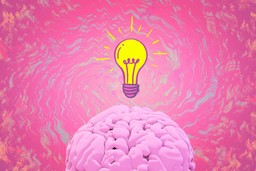Insights are considered to be one of the most valuable aspects of the psychedelic experience. These insights can be highly varied, relating to your past, personality, and relationships. Broader themes such as humanity, the natural world, and perhaps even metaphysics (the fundamental nature of reality) can also emerge.
These psychedelic insights, particularly when of a personal or ecological nature, are considered to be a core component of psychedelic therapy. Take these statements from subjects in clinical trials as examples:
“I was thinking about relationships I had with other people and thinking I could see them clearly almost as is for the first time. I had fresh insight into things. It was almost as if suddenly the scales dropped from my eyes, I could see things as they really are.”
“It’s almost as if when you take the capsules, it’s like taking onboard your own psychotherapist.”
“Before I enjoyed nature, now I feel part of it. Before I was looking at it as a thing, like TV or a painting. You’re part of it, there’s no separation or distinction, you are it.”[1]
However, researchers are now stressing that the insights psychedelics give you might not always be true. This warning has been based on the study of false (sober) insights, which have been generated among participants in a range of experimental designs. The “Aha!” moment – that feeling of suddenly believing you understand something – can occur in the context of false or unrelated information [2] [3].
However, there is a new preprint published by authors involved in these previous studies on false, sober insights. It focuses specifically on the issue of psychedelics generating false insights and beliefs. We can call this an epistemic risk of psychedelic use.
How Psychedelics Can Generate False Insights and Beliefs
In a preprint published on PsyArXiv, a team of researchers describe the potential of psychedelics to induce false or maladaptive beliefs [4], which is an under-researched subject. They refer to previous research—including their own—on false insights and false memories. They connect this to the psychedelic insights that can occur during such an experience. “We propose that the acute plasticity associated with psychedelics increases the quantity and precision of insights and thence beliefs, including false ones,” say the authors.
The researchers behind the paper include:
- Manoj Doss (at the Johns Hopkins Center for Psychedelic and Consciousness Research)
- Christopher Timmermann (at Imperial College London’s Centre for Psychedelic Research)
- Hilary Grimmer and Ruben Laukkonen (who have both studied the psychology of insight and “Aha!” moments).
Psychedelics Relax Our Beliefs
The authors acknowledge the potential benefits of psychedelics’ ability to alter our beliefs. An example is self-related beliefs, which appear to underpin positive psychological changes. But they also state that “if psychedelics do hold potential to change deeply held beliefs…and some proportion of these are likely to be false and yet feel insightful and true, there are major consequences to consider.”
The researchers highlight that psychedelics are effective at inducing belief relaxation [5], which may pertain to all sorts of beliefs (such as about ourselves or reality). They note that adaptive priors (our beliefs about facts and information) that typically constrain conclusions we make may also relax. As a result, this leads to false insights and hence false beliefs. They add, “With respect to setting, misleading contextual information could serve to increase the possibility of false insights.”
They state elsewhere that “rather than purely offering amelioration, psychedelics may also act as an amplifier for beliefs that enhance existing pathologies or even create new ones.” For example, such maladaptive beliefs may be based on delusions, paranoia, conspiratorial thinking, or a messiah complex, which are sometimes associated with psychedelic use.
Can We Minimize the Epistemic Risk of False Psychedelic Insights?
An important question the authors ask is as follows: “[H]ow do we improve the likelihood that the insights and subsequent belief changes engendered by psychedelics result in beliefs that move one closer to reality (rather than further away)?” They underscore the importance of an ‘epistemically congruent’ set and setting. This means that the user’s mindset and the environmental factors surrounding their ingestion of the psychedelic should align with their goals. Moreover, they argue that “contextual factors in the post-acute phases (in which ‘integration’ therapy occurs) need to optimally encourage and support positive and adaptive insights.”
This paper opens up other avenues for researchers to study the effects of set, setting, and therapeutic interventions on facilitating valuable and adaptive beliefs—rather than false and maladaptive ones. It should be emphasized, however, that judging an insight’s veracity is tricky, especially when related to philosophical issues like the nature of consciousness and reality. And other types of insights can be highly subjective in nature.
Psychedelic therapy is not considered an arena for debate in which truth and falsehood can always be concretely established. But it can still be a space in which patients can better make sense of their insights, in a way that feels autonomous and authentic. This is why the philosopher Peter Sjöstedt-Hughes has argued in an article for Frontiers in Psychology that metaphysical frameworks are needed to help people integrate their metaphysical experiences [6].
Are Psychedelics Therapeutic Because They Provide Comforting Delusions?
The journalist and author Michael Pollan raised an important question in his article “The Trip Treatment” published in The New Yorker:
“How are we to judge the veracity of the insights gleaned during a psychedelic journey? It’s one thing to conclude that love is all that matters, but quite another to come away from a therapy convinced that “there is another reality” awaiting us after death, as one volunteer put it, or that there is more to the universe—and to consciousness—than a purely materialist world view would have us believe. Is psychedelic therapy simply foisting a comforting delusion on the sick and dying?”
This is known as the “Comforting Delusion Objection” (CDO). The CDO is a problem that arises when psychedelic therapy is applied within the context of a materialist, scientific worldview. If the main therapeutic mechanism of psychedelics is a seemingly non-naturalistic, mystical experience – of transcendent realities, cosmic consciousness, or consciousness being more fundamental than matter – this finds discord with naturalism. According to a naturalistic worldview, such experiences are seen to be delusions, albeit comforting and therapeutic ones.
A Philosophical Response
The philosopher Chris Letheby addresses the CDO in his book Philosophy of Psychedelics (2020).
The three common responses to the objection are:
- Mystical psychedelic experiences are not delusions but veridical.
- It is not important whether such experiences are veridical or not; what matters is that they produce therapeutic outcomes.
- If psychedelic therapy is based on inculcating delusions, then it should be avoided (this is an ethical stance against epistemic harm).
Letheby, however, rejects all three responses while maintaining naturalism.
- He rejects the first because he assumes naturalism.
- He rejects the second because he believes the epistemic status—whether psychedelic states refer to reality or not—is important both in itself and therapeutically.
- He rejects the third because he denies that psychedelics are therapeutic because they foster false beliefs or comforting delusions – rather they induce experiences (those of connection, aspiration, and asking the big questions in life).
Letheby argues these experiences, rather than new metaphysical beliefs, are the main mechanism by which psychedelic therapy works. He and fellow philosopher Philip Gerrans have also maintained that psychedelics achieve therapeutic effects not by inducing belief in divine or cosmic consciousness. Rather, they improve mental health by violating our existing (and maladaptive) models of self, and by showing us what other kinds of self-models are possible.
Letheby rejects the notion that psychedelics provide true insights into metaphysical positions like ‘cosmic consciousness’ or a ‘divine reality’. This is because he subscribes to naturalism. However, the thought of such a position while on a psychedelic can feel like a clear insight. And these psychedelic insights are often shared. Nonetheless, the truth of any kind of metaphysical insight is hard to establish. Also, what may feel more relevant to people’s everyday living and well-being may not be the idea of a cosmic supermind. Instead, more significant may be insights related to interconnection, aspiring to greater things, asking questions about the meaning and purpose of our lives, and our sense of self.
Follow your Curiosity
Sign up to receive our free psychedelic courses, 45 page eBook, and special offers delivered to your inbox.References
- Watts, R., Krzanowski, J., Nutt, D., & Carhart-Harris, R. (2017). Patients’ accounts of increased “connectedness” and “acceptance” after psilocybin for treatment-resistant depression. Journal of Humanistic Psychology, 57(5), 520–564. https://psycnet.apa.org/record/2017-35544-005
- Grimmer, H., Laukonnen, R., Tangen, J., & Von Hippel, W. (2022). Eliciting false insights with semantic priming. Psychonomic Bulletin & Review, 29, 954–970. https://link.springer.com/article/10.3758/s13423-021-02049-x
- Laukonnen, R.E., Kaveladze, B.T., Protzko, J., Tangen, J.M., Von Hippel, W., & Schooler, J.W. (2022). Irrelevant insights make worldviews ring true. Scientific Reports, 12, Article: 2075. https://www.nature.com/articles/s41598-022-05923-3
- McGovern, H.T., Grimmer, H., Doss, M., Hutchinson, B., Timmermann, C., Lyon, A., Corlett, P.R., & Laukonnen, R. (2023). The power of insight: How psychedelics solicit false beliefs. Preprint published on PsyArXiv, 3 July. doi:10.31234/osf.io/97gjw. https://psyarxiv.com/97gjw/
- Carhart-Harris, R.L., & Friston, K.J. (2019). REBUS and the Anarchic Brain: Toward a Unified Model of the Brain Action of Psychedelics. Pharmacological Reviews, 71(3), 316–344. https://pharmrev.aspetjournals.org/content/71/3/316
- Sjöstedt-Hughes, P. (2023). On the need for metaphysics in psychedelic therapy and research. Frontiers in Psychology, 14, Article: 1128589. https://www.frontiersin.org/articles/10.3389/fpsyg.2023.1128589/full







